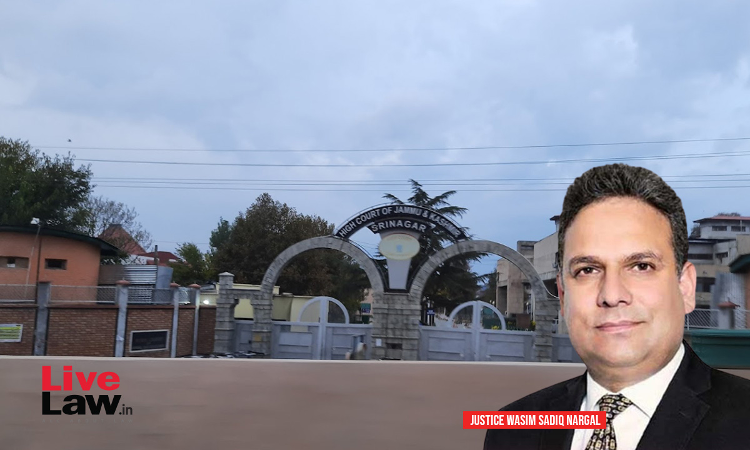- Home
- /
- High Courts
- /
- High Court of J & K and Ladakh
- /
- Investigation Cannot Be Transferred...
Investigation Cannot Be Transferred Merely To Satisfy Prestige: J&K High Court Dismisses Plea Seeking CBI Probe Into Alleged House Theft
LIVELAW NEWS NETWORK
10 July 2025 4:00 PM IST
Emphasising that the power of the constitutional courts cannot be exercised by transferring the investigation just for the asking nor is transfer directed only to satisfy the ego or vindicate prestige of a party interested for such investigation the High Court of Jammu and Kashmir and Ladakh at Srinagar dismissed a writ petition seeking a fresh investigation by the CBI into a house...
Emphasising that the power of the constitutional courts cannot be exercised by transferring the investigation just for the asking nor is transfer directed only to satisfy the ego or vindicate prestige of a party interested for such investigation the High Court of Jammu and Kashmir and Ladakh at Srinagar dismissed a writ petition seeking a fresh investigation by the CBI into a house burglary case.
A bench of Justice Wasim Sadiq Nargal accentuated that although the power of transfer from one Investigating Agency to another Investigating Agency like CBI can only be done by the Constitutional courts, such investigational transfers must be done in rare and exceptional cases, where the courts find it necessary.
These observations came in a petition filed by a couple who had left for Umrah in 2022, after securing their home and leaving valuables inside including gold ornaments worth ₹75 lakh and ₹4.5 lakh in cash. While abroad, they were informed of a theft at their home, which led to the registration of FIR under Sections 457 and 380 IPC.
Unhappy with the manner of investigation by the local police and Special Investigation Team (SIT), the petitioners approached the Chief Judicial Magistrate (CJM), Srinagar, seeking court-monitored investigation. Although directions were initially issued to the SDPO to appear with the case file, the matter concluded with a final report and closure by the CJM based on submissions of the Prosecuting Officer.
The petitioners, aggrieved by what they called a “shabby” investigation, sought a fresh probe by a more “professional and impartial agency” such as CID or CBI, and challenged the CJM's order dated January 29, 2025, which declined their request.
Petitioners' Counsel Mr. S.H. Thakur argued that the SIT's investigation was perfunctory and suffered from glaring defects and the CJM disposed of the protest petition without hearing their counsel.
Mr. Mohsin Qadiri, Sr. AAG, defended the trial court's order, arguing that the magisterial court acted within its legal limitations under CrPC and dissatisfaction alone with police investigation is insufficient to warrant transfer to another agency. The power to transfer probe to agencies like CBI vests only in constitutional courts and in rare and exceptional cases, he submitted.
Observations of the High Court:
Justice Nargal, after extensively analyzing legal precedents and statutory framework, declined to interfere with the CJM's order. The Court reiterated that:
“The power of transferring such investigation must be in rare and exceptional cases where the court finds it necessary in order to do justice between the parties and to instill confidence in the public mind.”
Quoting the Supreme Court's rulings in K.V. Rajendran v. Superintendent of Police and Mithilesh Kumar v. State of Rajasthan, the Court held:
“Even so, the availability of power and its exercise are two distinct matters. This Court does not direct transfer of investigation just for the asking nor is transfer directed only to satisfy the ego or vindicate the prestige of a party interested in such investigation.”
On the limits of magistrate courts, Justice Nargal clarified,
“The court of magisterial level does not have powers to order investigation by CBI… Even if the court comes to the conclusion that the investigation has not been conducted properly, it cannot order further investigation in terms of Section 173(8) of CrPC to be conducted by the CBI.”
The High Court underscored that neither Section 156(3) nor Section 173(8) CrPC grants subordinate courts the authority to direct a probe by CBI or other specialized agencies. Relying also on CBI v. State of Rajasthan (2001), the Court emphasized the structural and jurisdictional barriers preventing such orders by magistrates.
In conclusion, the Court held:
“Mere dissatisfaction with the manner in which the investigation was conducted, without any demonstrable perversity, illegality, or procedural impropriety, cannot furnish a ground to invoke the extraordinary inherent jurisdiction of this Court under Section 482 CrPC.”
Finding no error of law or miscarriage of justice in the CJM's order, the High Court dismissed the writ petition, upholding the trial court's decision and ruling out the possibility of a CBI probe.
Case Title: Dr Noor Mohammad Bilal Vs UT Of J&K
Citation: 2025 LiveLaw (JKL) 266



